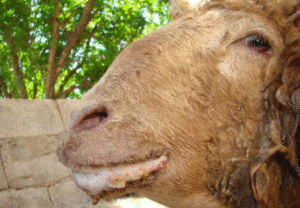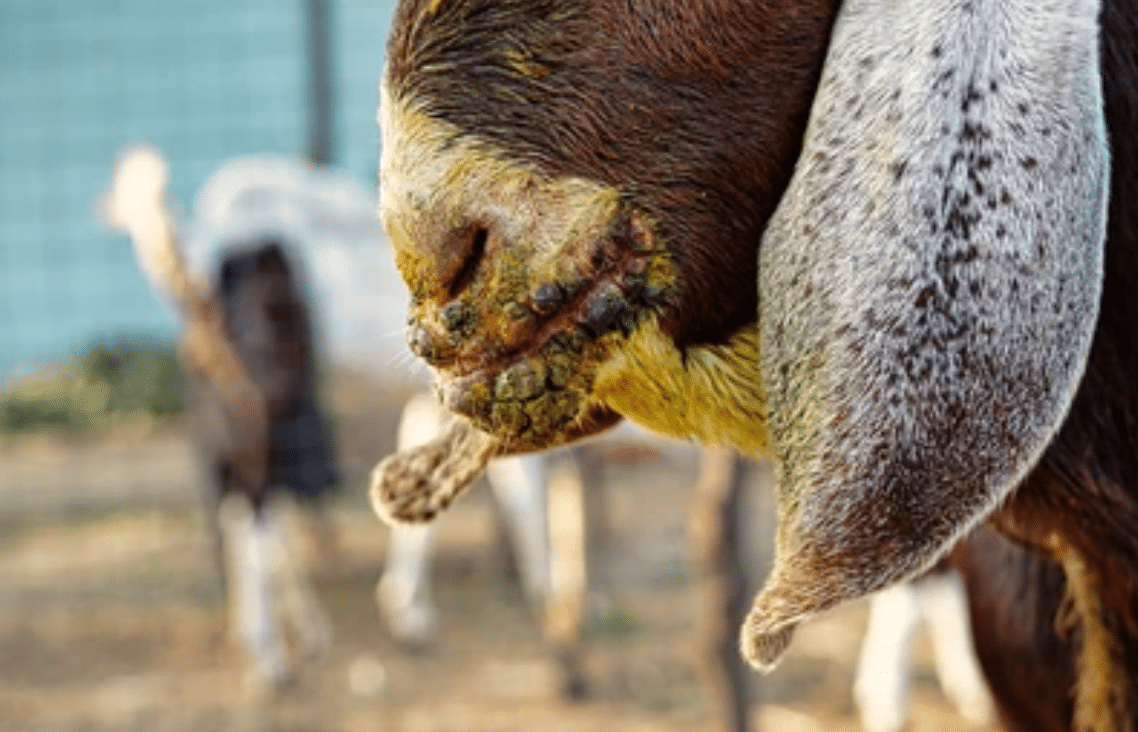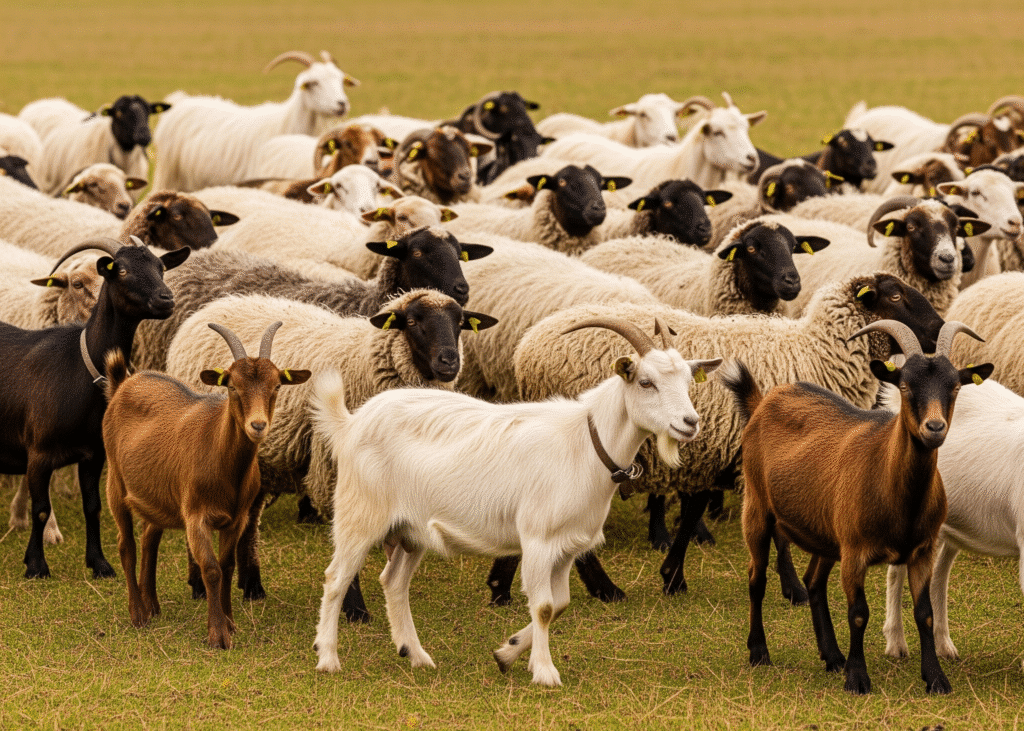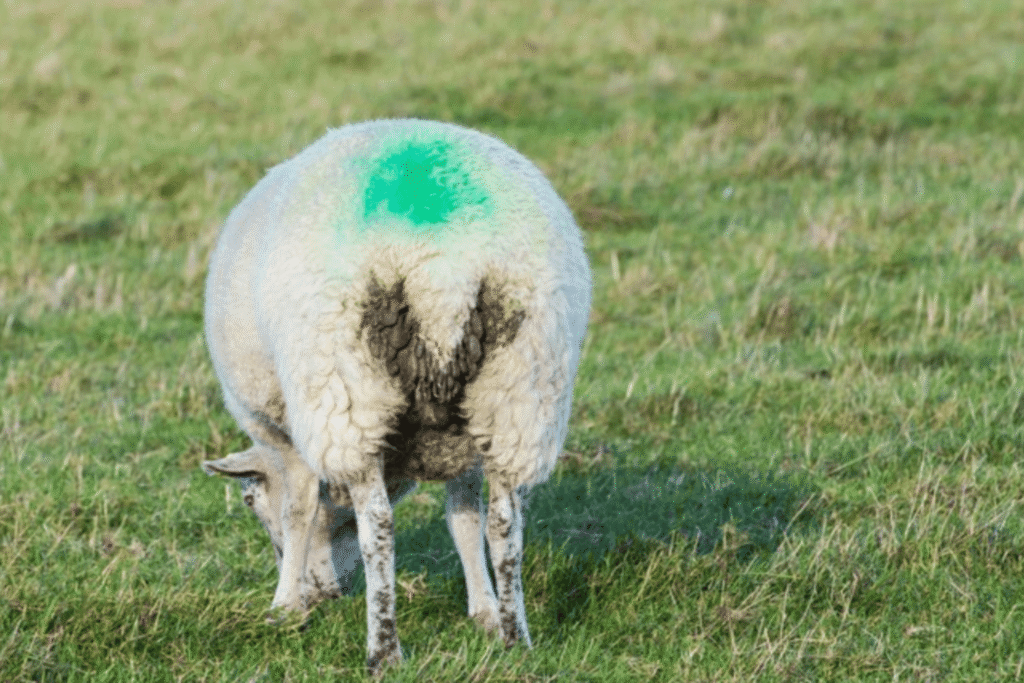Sore mouth disease, also known as contagious ecthyma, Orf, pustular dermatitis, or scabby mouth, is the most common skin disease affecting these livestock worldwide. Sour mouth, which is highly contagious viral infection is caused by a Parapoxvirus from the pox family. It leads to painful skin lesions, particularly around the muzzle, lips, and mouth of sheep and goats. The symptoms include Pain, blisters (vesicles), pimple-like bumps (pustules), and thick crusts (scabs) on the lips, nose, face, eyelids, nipples, udder, feet, and sometimes inside the mouth. The condition is often more severe in goats. While all breeds can be affected, anecdotal evidence suggests some, such as Boer goats, may be more susceptible.
Beyond animal health, sore mouth is a zoonotic disease, meaning it can spread from animals to humans. Farmers, veterinarians, and handlers can contract infections through direct contact with affected animals or recently vaccinated sheep or goats. Because the disease is not always familiar to physicians, it is critical to inform healthcare providers about exposure to infected livestock. By understanding the risks of sore mouth disease in sheep and goats and implementing protective strategies, both herd health and human safety can be safeguarded.
Sore Mouth can significantly impact animal health and productivity, making early recognition and proper herd management essential. The disease is widespread, with surveys showing that a large percentage of U.S. sheep operations have reported cases, highlighting its prevalence and the importance of preventative strategies.
Cause of Sore Mouth Disease
A Parapoxvirus causes sore mouth disease in goats and sheep. Parapoxvirus is a genus of viruses within the family Poxviridae. Like other poxviruses, it is a large, double-stranded DNA virus. What makes Parapoxviruses unique is their oval shape and distinct crisscross or spiral-like surface pattern. The most notable species in this group is the orf virus, which directly causes sore mouth disease. This virus is highly resilient and can survive for months or even years in the environment—especially in dried scabs—making it very persistent in livestock operations.
Parapoxviruses cause sore mouth disease by entering the body through  small cuts or abrasions in the skin. This often occurs when sheep or goats graze on rough or coarse feed that causes minor injuries around their mouths. Once the virus enters the host, it replicates within the skin cells, particularly in the epidermis, leading to painful blister-like lesions that develop into thick, crusty scabs. These scabs are highly contagious and are the main source of viral spread. Lesions most commonly appear on the lips and muzzle but may also affect the teats of nursing mothers, causing pain and rejection of their young. In severe cases, affected animals may stop eating, resulting in weight loss and weakness.
small cuts or abrasions in the skin. This often occurs when sheep or goats graze on rough or coarse feed that causes minor injuries around their mouths. Once the virus enters the host, it replicates within the skin cells, particularly in the epidermis, leading to painful blister-like lesions that develop into thick, crusty scabs. These scabs are highly contagious and are the main source of viral spread. Lesions most commonly appear on the lips and muzzle but may also affect the teats of nursing mothers, causing pain and rejection of their young. In severe cases, affected animals may stop eating, resulting in weight loss and weakness.
Sore Mouth Treatment in sheep and goat
Treatment for sore mouth disease is usually not needed for mild cases, as it is a viral, not a bacterial, infection. Severely affected animals, especially lambs and kids, require careful management that may include tube feeding to ensure they receive enough nutrition and hydration. With proper care and attention to the lesions, animals can recover fully.
However, a veterinarian should always be consulted for proper treatment and to help prevent the virus from spreading.
Antibiotics for Sour Mouth:
Antibiotic sprays are often used to prevent secondary bacterial infections and to clean the wounds. Many first-aid sprays are available on the market, but you should choose one that contains antibacterial (and possibly antiviral) ingredients.
Udder Care:
Ewes (mother sheep) and does (mother goats) with infected udders need special attention. Applying a suitable udder cream or salve helps keep the scabs on the nipples soft. If the infection is severe, the young (lambs and kids) should be separated and bottle- or tube-fed. To prevent further spread of the disease, do not allow infected young to nurse from healthy mothers. In serious cases, veterinarians may use antibiotics within the udder to prevent or treat mastitis (udder infection).
Good Hygiene:
Proper cleaning of infected areas, maintaining good hygiene, and providing a balanced diet are essential for recovery. Always isolate any animal showing symptoms of sore mouth immediately, as the Parapoxvirus can easily spread from one animal to another. While mild cases often heal on their own, veterinary supervision is important to ensure proper care and prevent outbreaks in the herd.
Sour Mouth Disease Transmission
Sore mouth is a contagious disease that affects goats and sheep. The virus can spread in many ways, such as through direct contact or by touching equipment or objects that have been used by infected animals. The virus can also survive on the skin or body of an uninfected animal and enter through the mouth or small cuts in the skin, causing infection.
Outbreaks are common among young animals, especially bottle-fed lambs and kids that share nipples. The virus can survive on surfaces and spread at shows or fairs through close contact. Animals that recover usually develop some resistance, but reinfection can occur because there are different strains of the virus. Fortunately, repeat infections are usually milder and shorter.
Prevention of Sour Mouth in Goat and Sheep
Preventing sheep from Sore mouth virus (parapoxvirus) is very difficult to control once it enters a herd. If any animal shows symptoms of soremouth, follow these steps quickly to protect the rest of the herd.
Healthy animals should be protected from the infected ones. The virus often enters the herd through new animals brought from outside. When buying new animals, always quarantine them for at least 21 days before mixing them with the herd.
Once a herd becomes infected, it is hard to eliminate the disease because the virus can survive in scabs. When scabs fall off infected animals, they can spread the virus to others months or even years later. This virus is very tough—it has special proteins that help it block the animal’s immune system.
The sore mouth virus can survive for months or even years outside the animal. Scabs left on pasture usually don’t last through winter, but the virus can survive in barns, pens, troughs, feeders, gates, and walls. Dried scabs can remain infectious for years if kept in a cool, dry place.
Cleaning is very important to control sore mouth. Regular cleaning removes infected material and reduces the risk of spreading the virus. All pens, feeders, and tools should be washed with soap and hot water, then disinfected with an effective disinfectant such as iodine or chlorine. Surfaces should be allowed to dry completely, and contaminated bedding or scabs should be burned or safely disposed of. Good cleaning and vaccination help protect healthy animals and prevent future outbreaks.
Sore Mouth Vaccine for Sheep and Goat
Ovine Ecthyma is a vaccine used to protect sheep and goats from sore mouth disease. It should only be used on healthy animals that are not already infected, as it helps control and reduce the spread of the disease. Pregnant animals should be vaccinated at least 7 weeks before lambing. Lambs can be vaccinated after the first day of birth.
The vaccine is made from a live virus taken from scabs of a mild form of sore mouth. The virus is modified so it doesn’t cause serious illness but produces a mild infection that helps animals build some immunity. However, the vaccine does not provide strong or long-lasting protection. It may not completely prevent animals from getting sore mouth, but it can make the disease less severe and shorter in duration.
How does sore mouth affect people?
Sore mouth (orf) is a zoonotic disease that affects sheep and goats and can spread to humans. People can become infected through direct contact with infected or recently vaccinated animals, or when handling the live vaccine. The virus enters through small cuts or abrasions on the skin, most often affecting the hands or arms.
In humans, infection causes small, firm red sores that may develop into moist nodules and form scabs. These lesions are usually painful and may last for several weeks to two months before healing without scarring. Mild fever and swollen lymph nodes can also occur, but serious illness is rare and usually affects people with weakened immune systems. Because the lesions can resemble more dangerous infections such as cutaneous anthrax, laboratory testing—available at the Centers for Disease Control and Prevention (CDC)—may be needed for confirmation.
To prevent infection, anyone handling infected or vaccinated animals should always wear nonporous disposable gloves and wash their hands thoroughly afterward. While sore mouth can cause serious problems in herds and pose a risk to humans, good hygiene, vaccination, isolation of infected animals, and veterinary guidance are key to controlling and preventing outbreaks.
Conclusion: Sour Mouth Disease in Goat and Sheep
Sore mouth disease, also known as orf, contagious ecthyma, or scabby mouth, remains one of the most common and economically significant viral infections in sheep and goats. Caused by the Parapoxvirus, this disease leads to painful sores around the mouth, udder, and other parts of the body, affecting feeding, growth, and milk production. Although sore mouth is typically self-limiting. Severe cases require proper veterinary care, good hygiene, and supportive treatment to prevent secondary infections.
To reduce the risk of outbreaks, farmers should regularly disinfect barns and equipment, quarantine new animals, and use the Ovine Ecthyma vaccine under veterinary guidance. Early detection, isolation of affected animals, and continuous monitoring can help control the spread of the virus within herds.
By following proper management, vaccination, and hygiene practices, farmers can effectively protect their flocks from sore mouth disease, ensuring healthier animals, improved productivity, and a safer working environment.
Because sore mouth is a zoonotic disease, it can also spread to humans through direct contact with infected or recently vaccinated animals. Therefore, wearing gloves, practicing biosecurity, and maintaining strict hygiene standards are essential for both animal and human safety.
FAQs Sour mouth disease in goat and sheep
What does a sore mouth mean in animals?
Sore mouth, also known as orf, contagious ecthyma, or scabby mouth, is a viral infection that mainly affects sheep and goats. A goat or sheep with sore mouth develops painful sores around the lips and mouth. Proxivurs also known as ORF virus cause sour mouth disease.
What virus causes mouth sores?
The Parapoxvirus, also called the orf virus, is the main cause of sore mouth disease in goats and sheep.
What is sore mouth?
Sore mouth is a disease caused by the orf virus that leads to the development of painful sores and scabs around the mouth of infected animals.
What is orf?
Orf is a type of poxvirus infection that causes sore mouth disease in goats and sheep.
What virus causes sores in the mouth?
The orf virus (Parapoxvirus)—a member of the poxvirus family—is responsible for causing sore mouth in goats and sheep.



